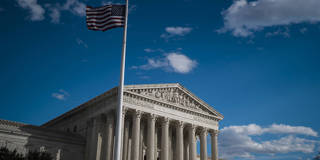Since its adoption, the US Constitution has structured Americans’ political discourse. So, it is striking, and probably dangerous, when an incipient ideological consensus channels those who opposed overturning the post-independence Articles of Confederation.
NEW YORK – To be an American is to argue about what it means to be an American. Even at the founding, we had almost nothing in common. We don’t share a national origin, a religious denomination, or a racial profile. All we have are ways of defining “we, the people” – those who, according to the Constitution, are the locus of sovereignty in a state conceived as the servant rather than the master of society.
That is why the Constitution has always been the baseline of political controversy here. Since its adoption, through the Civil War and Reconstruction (when it was reinvented by the three “freedom amendments”), to the recognition in the twentieth century of unenumerated rights, the Constitution has structured Americans’ political discourse. So, it is striking, and probably dangerous, when an incipient ideological consensus channels the Anti-Federalists, who opposed replacing the post-independence Articles of Confederation with the Constitution.
And such a consensus has in fact been emerging in recent years. Influential figures on both the left and the right now question the constitutional settlement of 1787-90, and, more important, repudiate its results.

NEW YORK – To be an American is to argue about what it means to be an American. Even at the founding, we had almost nothing in common. We don’t share a national origin, a religious denomination, or a racial profile. All we have are ways of defining “we, the people” – those who, according to the Constitution, are the locus of sovereignty in a state conceived as the servant rather than the master of society.
That is why the Constitution has always been the baseline of political controversy here. Since its adoption, through the Civil War and Reconstruction (when it was reinvented by the three “freedom amendments”), to the recognition in the twentieth century of unenumerated rights, the Constitution has structured Americans’ political discourse. So, it is striking, and probably dangerous, when an incipient ideological consensus channels the Anti-Federalists, who opposed replacing the post-independence Articles of Confederation with the Constitution.
And such a consensus has in fact been emerging in recent years. Influential figures on both the left and the right now question the constitutional settlement of 1787-90, and, more important, repudiate its results.